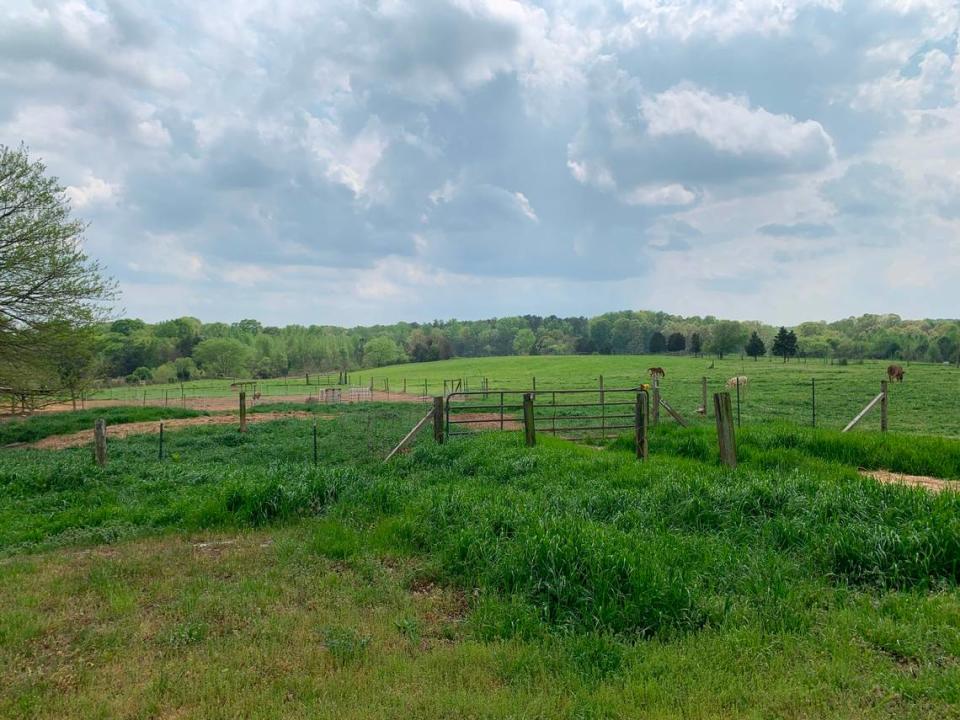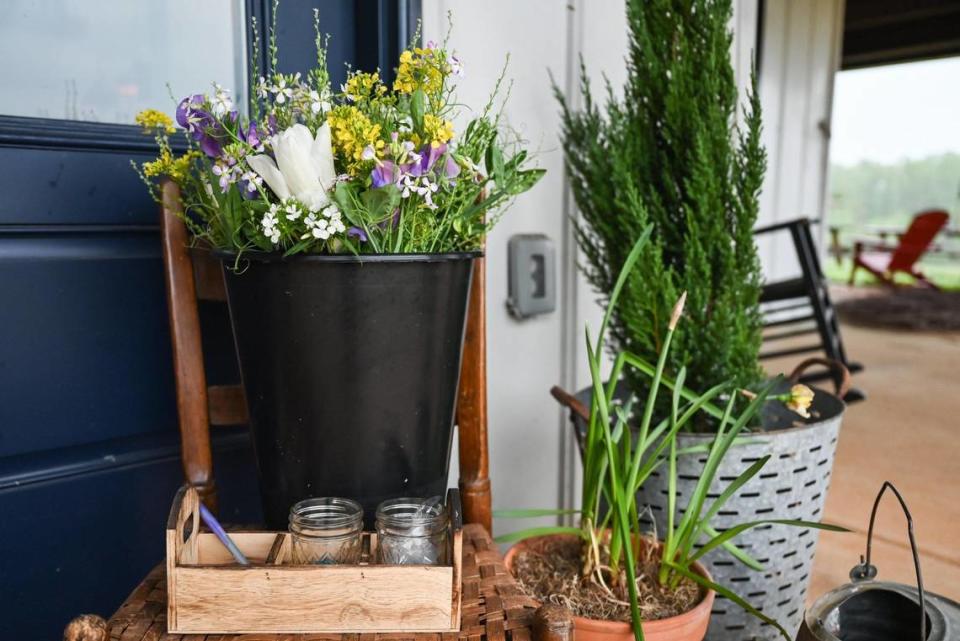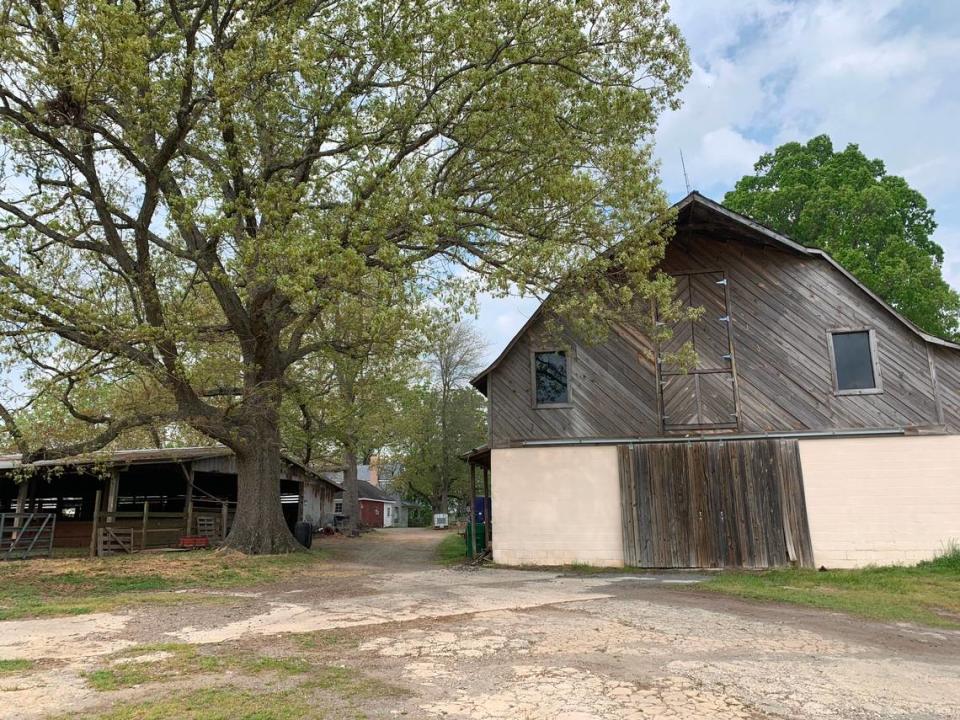Mecklenburg lost 100 square miles of farmland in 20 years. Will this plan save the rest?
As time ticked by, the tractor’s exhaust heated up.
Charlie Hodges waited several minutes on Rocky River Road with a load of hay in tow, and that was a least a couple minutes too long. By the time he looked left, then right and finally spotted a break in the traffic, the hay was on fire. He hopped off the tractor and ran back to the farmhouse to grab a water hose.
“It’s made it hard for us to make good use of this field across the road,” Hodges, business manager of Hodges Family Farm, said about ever-growing vehicle traffic. “We can’t move our animals over there.”
Traffic is just one symptom of the residential and commercial growth pushing farmland out of Mecklenburg County. As growth in Charlotte exploded and corporate farming between 1997 and 2017 pushed small farmers out of business, the county lost approximately 64,000 acres of farmland —about 100 square miles, said Evan Davis, farmland preservation director at the N.C. Department of Agriculture.

The state of North Carolina is expected to lose 1.2 million acres of farmland by 2040, which is more than 1,800 square miles, based on current development trends, according to the department.
The economic impact of losing that farmland would equal 9,100 farms lost, a $1.25 billion reduction in farm output, and 19,600 jobs lost, Davis said.
To stave off losing more farmland, Mecklenburg County is working on a plan to preserve its remaining 13,000 acres of farm property through land conservation efforts and workforce development for the next generation of farmers. The plan seeks to support existing farmers, create farming education programs and preserve local food sources.
How Mecklenburg County plans to save its farms
In October 2022, Mecklenburg County received a $14,000 grant to be used for its farmland preservation plan, said county’s sustainability and resiliency manager Erin Stanforth. The money must be used by October 2024.
One way the plan could preserve land is through a voluntary agriculture district — a county ordinance allowing landowners to publicly recognize their farms. It would also create an agricultural advisory board for Mecklenburg County, separate from soil and water conservation district board which is also involved with the county’s preservation plan.

Mecklenburg plans to create a funding strategy that would find land the county could buy and protect from development.
The county also plans to create a mentor and apprentice program to connect new farmers with experienced farmers and build a “next generation farmer guide” to pass down to those who inherit Mecklenburg’s farms.
Mecklenburg County would use existing and new grants to fund new equipment, supplies and educational courses and work with Johnson C. Smith University to provide workforce development opportunities for students.
Julia Rogers, owner of Blackberry Ridge Farm in Huntersville, has talked to the county about the plan and is creating a farm summer camp.

“I think it’s very important for kids to understand where food comes from,” Rogers said. “You know to have that connection with nature and agriculture.”
The plan could include new “agritourism weeks” and farmer showcases to spotlight local farms, Stanforth said. There could also be small grant opportunities for Mecklenburg farmers.
The county hopes the planning will result in preserving and creating access to local food, especially for low-income residents.
Charlotte farmer says plan for next generation
Hodges said he hopes the plan includes a focus on succession and estate planning.
His grandfather once grew profitable row crops, including cotton, and reared dairy cows in the early 1900s. Hodges remembers struggling to fall asleep on hot summer nights in the farmhouse with no air conditioning. They’re memories that make his Century Farm title a little more meaningful.
Now, paint peels off the half-inch cedar planks that make up the home’s siding. Hodges deals with pricey bills to renovate the farmhouse to modern standards.

“Historic homes are expensive to maintain,” Hodges said. “Farms don’t generate a lot of income.”
North Carolina has more than 1,800 century farms, but only 16 have the prestige of being 100 years old in Mecklenburg.
When Hodges’ brother died in 2015, he and his nephew Connor were left to run the farm. Connor Hodges maintains the farm while his uncle manages the business and works a different full-time job remotely.
If they weren’t willing to take on the business, Hodges Family Farm could have been east Charlotte’s newest apartment complex or strip mall.
“They don’t have someone to pass it down to,” Charlie Hodges said. “That’s why farms get sold.”
Losses cause Mecklenburg farms to turn to tourism
Having a good succession plan relies on the profitability of the farm, said Rogers of Blackberry Ridge Farm.
“Once it’s sold, it’s gone. I think that the importance is keeping farmland to where you can still make an income on it and it can still be profitable,” Rogers said. “And that’s a struggle Mecklenburg County faces ... to not let farmers get in a position where their only option for helping their family keep a viable income is to sell. It has to be profitable to keep going.”
Mecklenburg farms have constantly adapted over the years. The Hodges farm has shifted from focusing on row crops and cattle to adding pumpkins, bringing in paying visitors to the farm every October. They host about 25 weddings in a barn venue on the property each spring and fall. Over the past couple of years, they created an online store to sell items grown on the farm.
Blackberry Ridge Farm, also a century farm Rogers inherited from her family, turned to agritourism as well. Rogers and her husband grow flowers and hemp on the farm and sell bouquets and CBD products, but also bring guests to the farm to cut their own flowers or for different community events.
“We’re surrounded by these communities of people who have families and they want to be able to bring their children to see a farm to see something beautiful and unique in nature,” Rogers said. “So we’ve kind of just capitalized on that and we’ve created that environment for them to be able to come out here and enjoy the farm.”
Mecklenburg County Commissioners gave their unanimous endorsement for the plan in March, and county staff members plan to continue to work with local farmers to finalize the plan.
Those with questions can contact soil and water supervisor Barbara Bleiweis at Barbara.Bleiweis@mecknc.gov or Stanforth at Erin.Stanforth@mecknc.gov.

